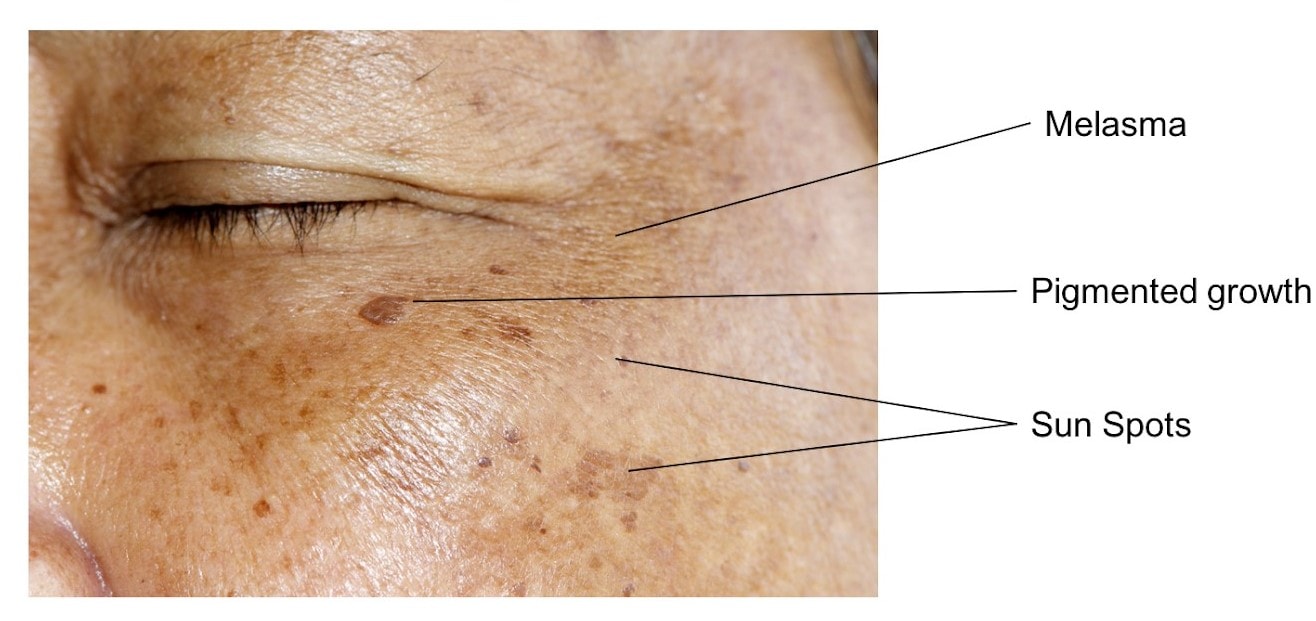Why do we have hyperpigmentation skin?
Hyperpigmentation occurs when there is an overproduction of melanin, the pigment that gives color to our skin, hair and eyes. This excess melanin can be caused by a variety of factors, including:
- Sun exposure: Overexposure to the sun’s UV’s rays can stimulate the production of melanin, leading to hyperpigmentation.
- Hormonal changes: Hormonal changes during pregnancy or while taking birth control pills can cause hyperpigmentation.
- Skin injuries: Any trauma or injury to the skin, such as cuts, burns, or acne, can lead to hyperpigmentation.
- Inflammation: Inflammatory skin conditions such as eczema, psoriasis, and dermatitis can lead to hyperpigmentation.
- Genetics: Some people may be more prone to hyperpigmentation due to their genetic makeup.
Hyperpigmentation can also occur as a result or certain medical conditions such as Addison’s disease, hemochromatosis, or exposure to certain chemicals or drugs. It’s important to see a dermatologist if you notice any changes in your skin color or pigmentation to determine the underlying cause and appropriate treatment options.
How to treat hyperpigmentation skin?
The treatment of hyperpigmented skin depends on the underlying cause and the severity of the condition. Here are some general strategies that can be helpful:
- Sun protection: Wearing sunscreen at least SPF 30 every day and avoiding direct sun exposure during peak hours can prevent further damage and pigmentation.
- Topical treatments: There are a variety of over-the-counter and prescription creams and serums that can help reduce the appearance of hyperpigmentation. These typically contain ingredients such as hydroquinone, retinoids, kojic acid, vitamin C, and niacinamide. These ingredients work by inhibiting melanin production or promoting its breakdown.
- Chemical peels: Chemical peels involve applying a solution to the skin that causes the top layer to peel off, revealing fresh, new skin underneath. This can help reduce the appearance of hyperpigmentation.
- Laser therapy: Laser treatments can target hyperpigmentation and break up melanin clusters in the skin.
- Microneedling: Microneedling involve using the device with tiny needles to create micro-injuries in the skin, which stimulates collagen production and helps to improve skin texture and tone.
- Microdermabrasion: Microdermabrasion involve the use of special tool to gently exfoliate the top layer of the skin and promote cell turnover. This can help to reduce appearance of hyperpigmentation, as well as other skin concerns.
What is the best product for hyperpigmentation skin?
There no is single “best” product fir hyperpigmentation as everyone’s skin is unique and may react differently to various ingredients. the most effective products for hyperpigmentation will depend on the underlying cause and severity of the condition. However, here are some products that are often recommended by dermatologists and have been shown to be effective in reducing the appearance of hyperpigmentation:
- Hydroquinone: This is a bleaching agent that is often prescribed by dermatologists to treat hyperpigmentation. It works by inhibiting the production of melanin in the skin. However, it should only be used under the supervision of a dermatologist and for short periods of a time due to potential side effects.
- Vitamin C: This antioxidant can help brighten the skin and reduce the appearance of dark spots and hyperpigmentation. Look for products that contain L-ascorbic acid, which is the most stable and effective form of vitamin C.
- Retinoids: Retinoids, such as retinol and tritinoine, can help exfoliate the skin and promote cell turnover, which can help reduce the appearance of hyperpigmentation. However, they can also cause irritation and sensitivity, so it’s important to start with a low concentration and use them sparerinly.
- Azelaic acid: This ingredient can help reduce the production of melanin in the skin and has anti-inflammatory properties. It is often used to treat hyperpigmentation caused by acne.
- Kojic acid: Kojic acid is a natural ingredient hat can help inhibit the production of melanin in the skin. It is often used to treat hyperpigmentation caused by sun damage and hormonal.
- Tranexamic acid: this ingredient can help reduce the appearance of hyperpigmentation by inhibiting the production of melanin in the skin reducing inflammation.
It’s important to note that using multiple products that contain these ingredients can be beneficial in reducing the appearance of hyperpigmentation. However, it’s important to start with a low concentration of each ingredient and gradually increase as tolerated to avoid irritation or sensitivity. Additionally, using broad-spectrum sunscreen with at least SPF 30 is crucial to prevent further damage and darkening of existing hyperpigmentation.
Products suggestion for Hyperpigmentation
- The Ordinary Niacinamide 10% + Zinc 1%: This is a serum that contains Niacianamide, which can help reduce the appearance of hyperpigmentation and regulate oil production in the skin. Zinc also helps to control inflammation.
- Murad Rapid Age Spot and Pigment Lightening Serum: This serum contain hydroquinone, glycolic acid, and hexapeptide-2, which work together to reduce the appearance of hyperpigmentation.
- Advance Skin Care: Contain 15% Vitamin C and Vitamin E with Ferulic acid. Skin brightening, reduce hyperpigmentation, fade dark spots
- Sunday Riley Good Genes Lactic Acid Treatment: This treatment contain Lactic acid, which can help exfoliate the skin and reduce the appearance of hyperpigmentation and dark spots.
- The Ordinary Azelaic Acid Suspension 10%: This cream contains Azelaic acid, which can help reduce the appearance of hyperpigmentation and improve overall skin tone.




It’s important to note that while these products may be effective in reducing the appearance of hyperpigmentation, they may not work for everyone. It’s also important to consult with dermatologist before trying any new products, particularly if you have sensitive skin or are prone to allergies.

